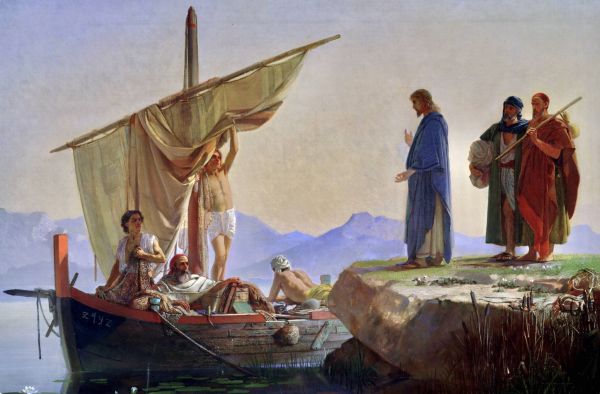Jesus, during his preaching and passing by the Sea of Galilee, calls to his retinue the first four disciples who, having left their nets, are about to become involved in the Gospel adventure for the Kingdom.
Francis feels the call to become a "fisherman" of men from the very beginning of his evangelical parable.
"Francis, who, never trusting in himself, sought inspiration from God in prayer in every decision, chose to live not for himself alone, but for Him who died for all, well aware that he had been sent by God to conquer the souls that the devil was trying to kidnap" (FF 381).
The explicit call that Christ had addressed to him had induced him to leave the nets of worldly life to become a herald of the Truth of the Gospel.
"In the church of the Virgin Mother of God dwelt, therefore, his servant Francis and insistently begged with continual groans She who conceived the Word full of grace and truth, that She might deign to become his advocate. And the Mother of mercy obtained by her merits that he himself conceived and gave birth to the spirit of gospel truth.
As he devoutly listened one day to the Apostles' Mass, he heard the Gospel passage recited in which Christ, sending the disciples to preach, gives them the Gospel way of life, saying:
"Keep neither gold nor silver nor money in your belts; have no travelling bag, nor two tunics, nor shoes, nor staff."
This he heard, understood, and committed to memory the friend of apostolic poverty, and immediately, filled with unspeakable joy, he exclaimed: "This is what I desire, this is what I yearn for with all my heart!"
He took off his shoes from his feet; he left his staff; he cursed his saddlebags and money and, content with only one little cassock, he threw away his belt and replaced it with a rope and put all his concern into discovering how to fully realise the words he had heard and to adapt himself in everything to the rule of holiness, dictated by the apostles" (FF 1051).
"From that moment the man of God, by divine incitement, devoted himself to emulating evangelical perfection and inviting all others to penance" (FF 1052).
Clare, as a little plant of the Seraphic Father, in her extraordinary Testament says:
"Among the other benefits, which we have received and every day receive from our Donor, the Father of mercies, for which we are greatly obliged to render to Him glorious living graces, great is that of our vocation.
And the greater and more perfect it is, the more we are obliged to him.
Therefore the Apostle admonishes: Know your vocation well" (FF 2823).
Monday 1st wk. in O.T. (Mk 1,14-20)












